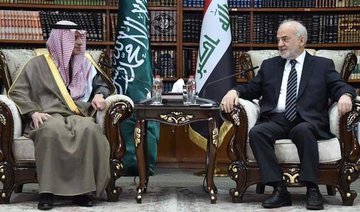WASHINGTON: Iraq’s prime minister, speaking on a high-level meeting to the US capital, has indicated that Baghdad seeks to “normalize” relations with Saudi Arabia.
Improved regional ties, the fight against Daesh and support from the US were all on the agenda during Haider Al-Abadi’s visit to Washington, which on Monday saw him meet US President Donald Trump for the first time in the Oval Office.
The prime minister struck a different tone to his predecessor Nuri Al-Maliki, in welcoming better relations with Iraq’s Arab neighbors including Saudi Arabia.
This comes a month after Saudi Foreign Minister Adel Al-Jubeir visited Baghdad — the first such visit by a Saudi official since 1991.
Al-Abadi said the “Saudi relations are warming, and at a very good track.”
In a speech delivered to the United States Institute of Peace after his meeting with Trump, Al-Abadi spoke of “an opening for a very good neighborly relationship” with Saudi Arabia.
“Don’t forget no Saudi official has visited Baghdad since 1991, not even after 2003, this is the first time, we welcome it,” he said.
VIDEO: Iraqi PM says Baghdad seeks to 'normalize' ties' with Saudi Arabia
The visit by Al-Jubeir was good for Saudi Arabia “to see what is happening in Iraq”, he added. “Our Saudi friends used to think Iraq is under control of our Iranian neighbors, but we are not and they saw for themselves,” Al-Abadi told his US audience.
Saudi-Iraqi cooperation to boost commercial and humanitarian ties could be one outcome of the visit, the official suggested.
Al-Abadi said Riyadh wants to have a role “in providing reconstruction for areas that are liberated from Daesh, and this is welcome for us, we want to normalize the relations.”
He added that “our aim is to control and stop regional conflict in the region... We cannot move Iraq from the map, and we… are to live with our neighbors.”
Counter-Daesh summit
Al-Abadi’s visit coincides with the Trump administration’s counter-Daesh summit in Washington. It is expected to convene 68 dignitaries on the foreign ministry level, with the aim of agreeing on a holistic strategy against the terror group.
Buoyed by military advances in Mosul against Daesh and good relations with senior officials in the Trump administration, Al-Abadi is holding high-level US meetings during his second state visit to Washington, where he was promised a “bigger commitment” and “assurances” 14 years after the US invasion.
Al-Abadi held breakfast talks with Vice President Mike Pence and met lawmakers from the House Foreign Affairs Committee in the US Congress. The advances in Mosul against Daesh were highlighted in the meetings.
Pence, according to the White House readout, “commended Iraqi Security Forces for their progress in western Mosul and thanked Prime Minister Al-Abadi for the sacrifices of the Iraqi people in our shared fight against Daesh.”
In the meetings with Trump and Pence, the US emphasized “opportunities to strengthen the bilateral relationship” and not allow any country to destabilize Iraq or its democratic institutions.
Both sides stressed as well a “commitment to the long-term partnership between the United States and Iraq grounded in the US-Iraq Strategic Framework Agreement” without getting into actual numbers of new US deployments or forces that could stay in Iraq after the defeat of Daesh.














